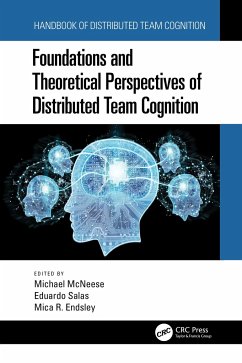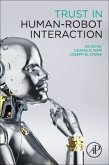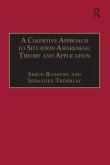Foundations and Theoretical Perspectives of Distributed Team Cognition
Herausgeber: McNeese, Michael; Endsley, Mica R.; Salas, Eduardo
Foundations and Theoretical Perspectives of Distributed Team Cognition
Herausgeber: McNeese, Michael; Endsley, Mica R.; Salas, Eduardo
- Gebundenes Buch
- Merkliste
- Auf die Merkliste
- Bewerten Bewerten
- Teilen
- Produkt teilen
- Produkterinnerung
- Produkterinnerung
This book looks at fundamentals, theoretical concepts, and how theory informs perspectives of thinking for distributed team cognition. The chapters yield a broad understanding of the nature of diverse thinking and insights into technologies, foundations, and theoretical perspectives of distributed team cognition.
Andere Kunden interessierten sich auch für
![Designing for Situation Awareness Designing for Situation Awareness]() Mica R. EndsleyDesigning for Situation Awareness114,99 €
Mica R. EndsleyDesigning for Situation Awareness114,99 €![Decision-Making Under Stress Decision-Making Under Stress]() Rhona FlinDecision-Making Under Stress214,99 €
Rhona FlinDecision-Making Under Stress214,99 €![Fields of Practice and Applied Solutions within Distributed Team Cognition Fields of Practice and Applied Solutions within Distributed Team Cognition]() Fields of Practice and Applied Solutions within Distributed Team Cognition185,99 €
Fields of Practice and Applied Solutions within Distributed Team Cognition185,99 €![Trust in Human-Robot Interaction Trust in Human-Robot Interaction]() Trust in Human-Robot Interaction113,99 €
Trust in Human-Robot Interaction113,99 €![A Cognitive Approach to Situation Awareness A Cognitive Approach to Situation Awareness]() Sébastien TremblayA Cognitive Approach to Situation Awareness61,99 €
Sébastien TremblayA Cognitive Approach to Situation Awareness61,99 €![Human Factors in Land Use Planning and Urban Design Human Factors in Land Use Planning and Urban Design]() Nicholas J. StevensHuman Factors in Land Use Planning and Urban Design54,99 €
Nicholas J. StevensHuman Factors in Land Use Planning and Urban Design54,99 €![Linking Expertise and Naturalistic Decision Making Linking Expertise and Naturalistic Decision Making]() Linking Expertise and Naturalistic Decision Making66,99 €
Linking Expertise and Naturalistic Decision Making66,99 €-
-
-
This book looks at fundamentals, theoretical concepts, and how theory informs perspectives of thinking for distributed team cognition. The chapters yield a broad understanding of the nature of diverse thinking and insights into technologies, foundations, and theoretical perspectives of distributed team cognition.
Produktdetails
- Produktdetails
- Verlag: Taylor & Francis Ltd
- Seitenzahl: 246
- Erscheinungstermin: 29. September 2020
- Englisch
- Abmessung: 240mm x 161mm x 18mm
- Gewicht: 532g
- ISBN-13: 9781138625549
- ISBN-10: 113862554X
- Artikelnr.: 60015898
- Herstellerkennzeichnung
- Libri GmbH
- Europaallee 1
- 36244 Bad Hersfeld
- gpsr@libri.de
- Verlag: Taylor & Francis Ltd
- Seitenzahl: 246
- Erscheinungstermin: 29. September 2020
- Englisch
- Abmessung: 240mm x 161mm x 18mm
- Gewicht: 532g
- ISBN-13: 9781138625549
- ISBN-10: 113862554X
- Artikelnr.: 60015898
- Herstellerkennzeichnung
- Libri GmbH
- Europaallee 1
- 36244 Bad Hersfeld
- gpsr@libri.de
Michael D. McNeese is a Professor (Emeritus) and was the Director of the MINDS Group (Multidisciplinary Initiatives in Naturalistic Decision Systems) at the College of Information Sciences and Technology, The Pennsylvania State University, University Park, PA. Previously, he was the Senior Associate Dean and Professor in Charge at Penn State. He has worked on multiple research projects involving team cognition, artificial intelligence, human factors engineering, crisis management and response, situation awareness, and interactive simulations over the last 35 years. He was a Senior Scientist and Director of Collaborative Design Technology at the USAF Research Laboratory prior to moving to Penn State. Dr. McNeese earned a PhD in cognitive science at Vanderbilt University and an MA in experimental-cognitive psychology at the University of Dayton, was a visiting professor at The Ohio State University, Department of Integrated Systems Engineering. Eduardo Salas is the Allyn R. and Gladys M. Cline Chair Professor and Chair of the Department of Psychological Sciences at Rice University. He is a past president of the Society for Industrial and Organizational Psychology (SIOP) and the Human Factors and Ergonomics Society (HFES), and a fellow of the American Psychological Association (APA), Association for Psychological Science, and HFES. He is also the recipient of the 2012 Society for Human Resource Management Losey Lifetime Achievement Award, the 2012 Joseph E. McGrath Award for Lifetime Achievement for his work on teams and team training, and the 2016 APA Award for Outstanding Lifetime Contributions to Psychology. He earned a PhD (1984) in industrial/organizational psychology at Old Dominion University. Mica R. Endsley is the President of SA Technologies, a cognitive engineering firm specializing in the development of operator interfaces for advanced systems, including the next generation of systems for military, aviation, air traffic control, medicine, and power grid operations. Previously she served as Chief Scientist of the U.S. Air Force and was the chief scientific adviser to the Chief of Staff and Secretary of the Air Force. She has also been a visiting associate professor at MIT and an associate professor of industrial engineering at Texas Tech University. She earned a PhD in industrial and systems engineering at the University of Southern California. She is a past president and fellow of the Human Factors and Ergonomics Society and a fellow of the International Ergonomics Association.
1. Distributed Team Cognition: Integration, Evolution, and Insight 2.
Reflections on Team Simulations-Part I: Historical Precedence 3.
Reflections on Team Simulations-Part II: Contemporary Progressions 4.
Distributed Cognition in Teams Is Influenced by Type of Task and Nature of
Member Interactions 5. Bees Do It: Distributed Cognition and Psychophysical
Laws 6. Collaborative Action (COACT) Theory: Socially Constructing Shared
Knowledge through Mutual Attunement of Shared Affordances 7. Mismatches
between Perceiving and Actually Sharing Temporal Mental Models:
Implications for Distributed Teams 8. Expertise and Distributed Team
Cognition: A Critical Review and Research Agenda 9. Lenses of Diversity in
Distributed Teams
Reflections on Team Simulations-Part I: Historical Precedence 3.
Reflections on Team Simulations-Part II: Contemporary Progressions 4.
Distributed Cognition in Teams Is Influenced by Type of Task and Nature of
Member Interactions 5. Bees Do It: Distributed Cognition and Psychophysical
Laws 6. Collaborative Action (COACT) Theory: Socially Constructing Shared
Knowledge through Mutual Attunement of Shared Affordances 7. Mismatches
between Perceiving and Actually Sharing Temporal Mental Models:
Implications for Distributed Teams 8. Expertise and Distributed Team
Cognition: A Critical Review and Research Agenda 9. Lenses of Diversity in
Distributed Teams
1. Distributed Team Cognition: Integration, Evolution, and Insight 2.
Reflections on Team Simulations-Part I: Historical Precedence 3.
Reflections on Team Simulations-Part II: Contemporary Progressions 4.
Distributed Cognition in Teams Is Influenced by Type of Task and Nature of
Member Interactions 5. Bees Do It: Distributed Cognition and Psychophysical
Laws 6. Collaborative Action (COACT) Theory: Socially Constructing Shared
Knowledge through Mutual Attunement of Shared Affordances 7. Mismatches
between Perceiving and Actually Sharing Temporal Mental Models:
Implications for Distributed Teams 8. Expertise and Distributed Team
Cognition: A Critical Review and Research Agenda 9. Lenses of Diversity in
Distributed Teams
Reflections on Team Simulations-Part I: Historical Precedence 3.
Reflections on Team Simulations-Part II: Contemporary Progressions 4.
Distributed Cognition in Teams Is Influenced by Type of Task and Nature of
Member Interactions 5. Bees Do It: Distributed Cognition and Psychophysical
Laws 6. Collaborative Action (COACT) Theory: Socially Constructing Shared
Knowledge through Mutual Attunement of Shared Affordances 7. Mismatches
between Perceiving and Actually Sharing Temporal Mental Models:
Implications for Distributed Teams 8. Expertise and Distributed Team
Cognition: A Critical Review and Research Agenda 9. Lenses of Diversity in
Distributed Teams









